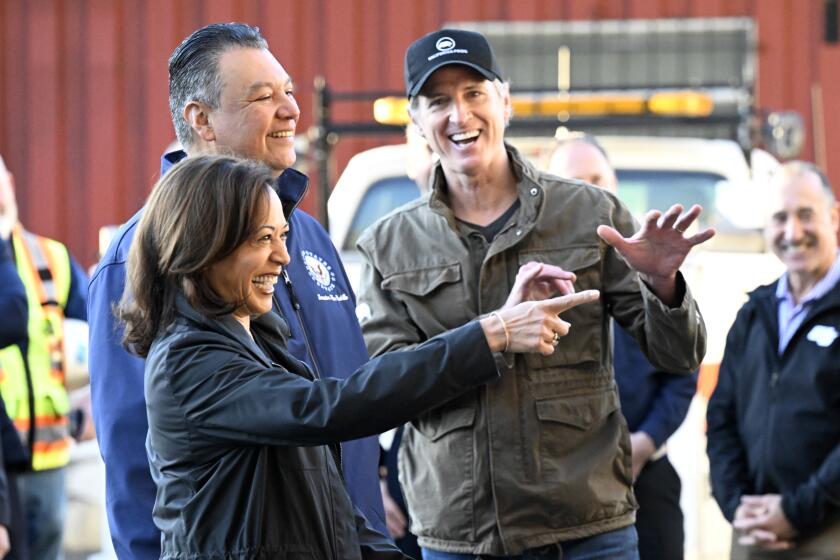Rice Likens Iraq to Postwar Germany
The Bush administration warned Thursday that the reconstruction of Iraq and the wider Middle East will require the same “generational commitment” that went into rebuilding Germany and Europe after World War II.
National security advisor Condoleezza Rice, invoking the historic parallel, said postwar Germany had been as messy as postwar Iraq, and yet Germany eventually became the “linchpin” of a fully democratic Europe.
“The historical analogy is important,” Rice said in a Dallas speech. “If that different future is to be realized, we and our allies must make a generational commitment to helping the people of the Middle East transform their region.”
As the United States today marks 100 days since declaring the end of major combat, the Bush administration’s top national security team is fanning out in public appearances and editorial comment to recast its mounting problems in Iraq as mere glitches on the road to success.
Rice, speaking at the annual convention of the National Assn. of Black Journalists, said that Americans looked back only on the U.S. successes in postwar Germany, but American forces there faced the so-called werewolves, Nazi remnants who attacked Allied troops and engaged in sabotage “much like today’s Baathist and Fedayeen remnants” in Iraq.
The Marshall Plan, at the time the largest U.S. foreign aid package devised, came in response to failed efforts to rebuild Germany in late 1945 and 1946, she added.
U.S. troops will not need to be in Iraq as long as they have been in Germany, now almost 60 years, but the United States will need to engage “broadly” throughout the region economically, diplomatically and culturally, Rice said. “We must have the patience and perseverance to see it through.”
Rice’s comments came as Lt. Gen. Ricardo Sanchez, commander of coalition forces in Iraq, told reporters in the country Thursday that U.S. troops would have to stay in Iraq for two years at an “absolute minimum” -- and probably longer -- to give Iraqis time to develop a new army of at least three motorized divisions capable of defending the country.
In his briefing of foreign reporters in Washington, with a video linkup to correspondents in New York and Los Angeles, Secretary of State Colin L. Powell called the current period “a time of hope and promise” and stressed the U.S.-led coalition’s achievements in Iraq.
“In Iraq, a dictator is gone. A people are free. They are returning to schools. They are opening their universities. The power is being restored. The infrastructure is being rebuilt. The economy is starting to function,” he said.
But Powell also acknowledged that neither the death of Saddam Hussein’s two sons last month nor the capture or killing of the former Iraqi leader would solve current security problems.
Groups both inside and outside Iraq are still determined to defy the U.S.-led coalition and deny Iraqis “a better life and a new country,” he told reporters.
As a result, the U.S. is now shifting tactics, showing more flexibility as the threat changes, he said. Coalition troops may increasingly hand over local security to Iraqi forces to lower the U.S. military profile, he said.
“It may not always be the best technique [for U.S. forces] to flood an area. Maybe what you want to do is stand back a little bit more and let Iraqis, local officials -- we’ve started to create security forces -- that will protect installations so that you don’t need a coalition military organization protecting that installation,” Powell said.
Comparing the decisions to a quarterback’s last-second adjustments in a football game, the secretary said U.S. commanders would from now on have to “call audibles” and alter tactics as the situation on the ground changes.
But the bombing of the Jordanian Embassy in Iraq on Thursday and the JW Marriott Hotel in Indonesia on Tuesday served as reminders that the “civilized world must come together to defeat this scourge of terrorism” however and wherever it strikes, Powell added.
Despite the Arab League’s decision not to recognize the new U.S.-appointed Iraqi Governing Council, Powell heralded the panel of 25 Iraqis from diverse religious, tribal and ethnic groups as the important first step in the return to full sovereignty.
Washington will work with the Arab League to try to persuade the 22-member bloc to change its position before the league’s September meeting, Powell said.
On another front in the volatile Middle East, Powell said the United States was engaged in talks with Israel over a controversial barrier that separates the West Bank from Israel. The issue is not the fence but its route, which occasionally intrudes on Palestinian areas and divides farmlands and cuts off villages, and the potential for Israel to someday say it marks the borders of a Palestinian state, he said.
Through media leaks and diplomatic reminders, the United States has let Israel know this week that it may deduct Israel’s expenditures on the fence from the $9 billion in loan guarantees passed this year by Congress.
In the toughest public language to date, Powell said the United States had identified some problems with current and future stages of the fence. “We have to be faithful to the congressional direction that we had with respect to how to use these loan guarantee moneys,” he said.
More to Read
Get the L.A. Times Politics newsletter
Deeply reported insights into legislation, politics and policy from Sacramento, Washington and beyond. In your inbox three times per week.
You may occasionally receive promotional content from the Los Angeles Times.










